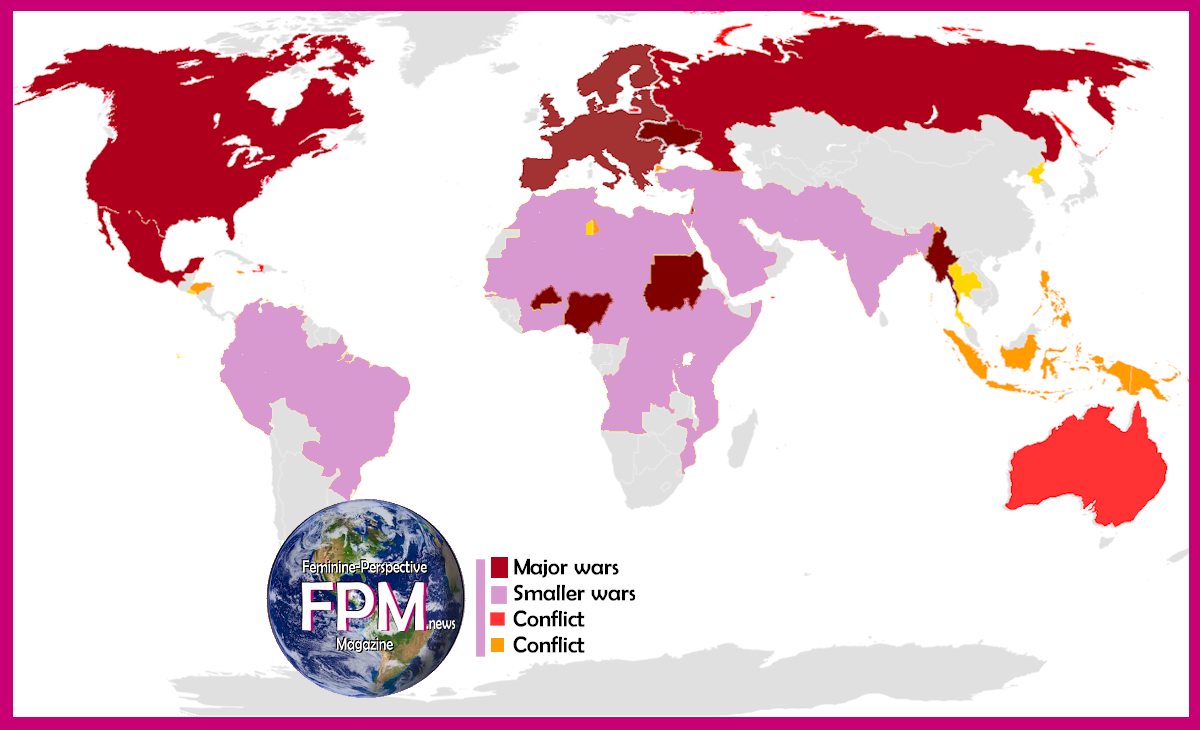The RINJ Foundation Adduces That Female Genital Mutilation is a Sexual Assault Crime.
In this video we teach what FGM is and how we can surgically help victims of this crime.
More than 125 million girls and women alive today have been mutilated. (WHO)
FGM is defined by The RINJ Foundation as a sexual assault crime where no other statute exists for its definition.
Just because your country doesn’t have an FGM law, it is no less a crime.
In this artistic video, “to fly” is to feel ‘down there’ again. We illustrate the feeling of inadequacy and specify the urge to become whole and to again “fly”.
Some nations have defined Female Genital Mutilation as a crime of its own definition. The RINJ Foundation, relying on a compendium of statutes around the globe as well as relying on the existing United Nations resolutions, has adduced that FGM where it may otherwise not be defined in a nation’s statutes, is a serious sexual assault crime and as such should be treated as a major crime.
January 28, 2015: Update, Syria and Iraq
Allegedly, Abu Bakr al-Baghdadi, leader of the self-declared Islamic State, has ordered the female genital mutilation of two million Kurdish and Iraqi girls to distance them from debauchery and immorality.
The RINJ Foundation seeks to make it explicitly clear to all persons that this practice of FGM is a crime by international consensus.
Rumours investigated by the UN and by various media have raised this concern although the likelihood of a serious Fatwa with ISIL enforcement seems ludicrous. No doubt such a Fatwa is on Abu Du’a’s wish list.
The RINJ Foundation seeks to make it explicitly clear to all persons that this practice of FGM is a crime by international consensus.
In August 2014, The RINJ Foundation adduced that FGM is a violent sexual assault crime.
In December 2012, the UN General Assembly adopted a resolution on the elimination of female genital mutilation.
In 2010 WHO published a “Global strategy to stop health care providers from performing female genital mutilation” in collaboration with other key UN agencies and international organizations.
In 2008 WHO together with 9 other United Nations partners, issued a new statement on the elimination of FGM to support increased advocacy for the abandonment of FGM. The 2008 statement provides evidence collected over the past decade about the practice. It highlights the increased recognition of the human rights and legal dimensions of the problem and provides data on the frequency and scope of FGM. It also summarizes research about on why FGM continues, how to stop it, and its damaging effects on the health of women, girls and newborn babies.
Female genital mutilation (FGM) is a surgery that intentionally alters the female genital organs for non-medical reasons including deliberate total or partial removal of the female genitalia (explained further).
The procedure can make urination painful; sexual pleasure impossible; childbirth torturous. It can also lead to infertility, incontinence, infection, fistulas, and death. It is a violent sexual assault against a non-consenting, unwilling, female–often a child.
There are several types of FGM: including the removal of part or all of the clitoris, to the entire removal of the labia (or outer lips around the vagina), to “infibulation” which is the narrowing of the vaginal opening by creating a seal using skin from the labia.
It’s often seen as a way to protect women from promiscuity, since the genitals contain many nerve endings that enhance sexual pleasure, and mutilating them blunts the libido.
This is a violent degradation of females and must cease no matter what steps are necessary..
There are no health benefits but there are immediate risks, including death. Women can be left hemorrhaging, with severe pain, wound infections including tetanus and gangrene, or blood-borne infections such as HIV and hepatitis B and C. Sometimes it affects a woman’s ability to urinate or disrupts her bowels.
The ensuing harm can include:
- chronic vaginal and pelvic infections
- abnormal periods
- difficulty passing urine, and persistent urine infections
- kidney impairment and possible kidney failure
- damage to the reproductive system, including infertility
- cysts and the formation of scar tissue
- complications in pregnancy and newborn deaths
- pain during sex and lack of pleasurable sensation
- psychological damage, including low libido, depression and anxiety (see below)
- flashbacks during pregnancy and childbirth
- the need for later surgery to open the lower vagina for sexual intercourse and childbirth
Origins Of FGM
The origins of the practice are unclear. It predates the rise of Christianity and Islam. There is mention made of Egyptian mummies that display characteristics of FGM/FGC. Historians such as Herodotus claim that in the fifth century BC the Phoenicians, the Hittites and the Ethiopians practised circumcision. It is also reported that circumcision rites were practised in tropical zones of Africa, in the Philippines, by certain tribes in the Upper Amazon, and in Australia by women of the Arunta tribe. It also occurred among the early Romans and Arabs. As recent as the 1950s, clitoridectomy was practised in Western Europe and the United States to treat ‘ailments’ in women as diverse as hysteria, epilepsy, mental disorders, masturbation, nymphomania, melancholia and lesbianism. In other words, the practice of FGM/FGC has been followed by many different peoples and societies across the ages and the continents.
Excuses Given for Female Genital Mutilation
The given reasons for the practice of FGM (primarily in the 28 African countries, and a few countries in the Middle East and Asia) is the set of beliefs, values, cultural and social behaviour patterns that govern the lives of people in society. The various reasons can be categorized into five headings as follows:
Psychosexual Excuses
FGM/FGC is carried out as a means to control women’s sexuality (which is argued to be insatiable if parts of the genitalia, especially the clitoris, are not removed). It is thought to ensure virginity before and fidelity after marriage and/or to increase male sexual pleasure.
Sociological And Cultural Excuses
FGM/FGC is seen as part of a girl’s initiation into womanhood and as an intrinsic part of a community’s cultural heritage/tradition. Various myths exist about female genitalia (e.g. that if not removed the clitoris will grow to the size of a penis; FGM/FGC would enhance fertility or promote child survival, etc.) and these serve to perpetuate the practice.
Hygiene And Aesthetic Excuses
In some communities, the external female genitalia are considered dirty and ugly and are removed ostensibly to promote hygiene and aesthetic appeal.
Religious Excuses
Although FGM/FGC is not sanctioned by either Islam nor by Christianity, supposed religious prescripts (e.g. the mention of ‘Sunna” in the Koran) are often used to justify the practice. Another example is Opus Dei which seeks to prevent female members and their offspring from ‘enjoying’ masturbation or partner-intimacy.
FGM within Opus Dei should be no surprise. One of the pillars of Opus Dei is misogyny.
Says Eronn Strickland, a former student at what she describes as “One of those weird, secretive Opus Dei schools“, “Opus Dei is incredibly sexist — men in Opus Dei centers do not cook or clean for themselves but have female “[super]numerary assistants” (often from low-income families or foreign countries) take care of domestic issues.”
“Most people,” notes Strickland, “who have heard of Opus Dei learned about it through one of the following ways:
- They read about in Dan Brown’s best seller, the Da Vinci Code.
- They learned about it when a member of Opus Dei, Robert Hanssen, was arrested and eventually convicted of selling American intel to the Russians.
Socio-Economic Reasons
In some communities, FGM/FGC is even a prerequisite for marriage. Where women are largely dependent on men, economic necessity can be a major determinant to undergo the procedure. FGM/FGC sometimes is a prerequisite for the right to inherit. FGM/FGC may also be a major income source for circumcisers.
Conclusion
The “medicalization” of FGM which is wilful damage to healthy organs for non-therapeutic reasons is unethical and has been consistently condemned by WHO. (World Health Organization as well as outlawed in Canada (1992) and the United States (1995).
Religious extremism fuels this physical mutilation and emotionally-damaging (even deadly) practice.
FGM is present in North America for a few reasons, one being immigration and the other being domestic fanatic religious zealots.
The latter we shall not discuss in detail for the moment due to a current investigation.
Religious groups include (but are by no means limited to) members of the Catholic cult Opus Dei. The Catholic church is vehemently, radically and zealously opposed to fornication, masturbation, homosexuality, birth control…etceteras.
Opus Dei, as a cult of the Catholic church, shares the views of the Catholic church on sexuality. Opus Dei is very secretive of its ways and practices. Some practices of Opus Dei were exposed in the book The Da Vinci Code by Dan Brown. FGM is sometimes practiced by Catholic/Opus Dei religious zealots in the US and Canada! FGM is performed at varying ages on girls in order to eliminate sexual pleasure and satisfaction.
In scalping the tip of the clitoris (as in ‘excision’) or removing completely the clitoris, the result is the lack of the ability to have a clitoral orgasm or sexual tension release. The woman has lost part of her body and her sexuality. Masturbation by stimulation of the clitoris is futile although many girls struggle alone at night with this for hours as there is no clitoris after FGM has been performed.
Opus Dei views women as chattels and their sole purpose is to produce children and raise them to be Opus Dei members (“soldiers for God”). Sexual intercourse is solely for procreation and only males should derive pleasure from the action. This is a seriously skewed and harmful view towards women.
It is no wonder there is so much spousal abuse and domestic violence in these cults. When women are mistreated and abused it is damaging to all. Abuse fuels more abuse, the abused become the abusers…The seemingly endless chain of abuse needs to be broken with the cessation of mutilating women.
Female Genital Mutilation in all forms, in all communities, in all countries, for all reasons, MUST be stopped!
Related News:
FGM (Female Genital Mutilation) In The USA
The RINJ Foundation once known as RINJ Campaign in the late 2000s during the end of the George Bush era was telling Opus Dei FGM survivors to flee the country and seek refugee status somewhere if the could not get away from the oppressive cult. Some grown women upon discovering their issues of depression and sexual dysfunction even go to France where a Dr. Fouldes was reversing some of the American FGM procedures and to Berlin Germany’s Desert Flower clinic.
The RINJ Foundation fought a bitter fight with the Opus Dei people who infiltrated the US Food and Drug Administration during the George Bush era.
Some Doctors Near Maclean Virginia and in Chicago (Two major Opus Dei Centers) were doing a surgical removal of the nerves to the clitoris inside various O/Rs including the Walter Reed Hospital in Chevy Chase, charging wealthy Opus Dei families to bring daughters from age 2 to 6 to become FGM victims for up to $10,000.00.Each.

These Opus Dei people felt that the work of God was better done if girls had no temptation to sex including masturbation. Removing the function of the clitoris in a neuro-surgical manner would achieve that result and because this is an area of the body that heals rapidly (think about child birth’s ripping, stretching and tearing and the subsequent healing after a few weeks) getting caught for the illegal procedure would be unlikely. (Federal law passed in 1998 against FGM.)
For surgeons performing this procedure, in order to be prosecuted under USA statutes, they would have to be caught by a surgically trained police officer who had been allowed to attend the surgery or who had obtained a search warrant for exactly the right moment. There is no such enforcement in the United States and the procedure is now done across the States by neurosurgeons and others less qualified.
The RINJ Foundation has adduced that FGM is a Sexual Assault Crime where no specific FGM law is in place.
A clinic, at University College Hospital in the U.K. started in September 2014 giving medical treatment and psychological help to girls aged from babies to 18 who have been mutilated there or overseas. It will also provide expert advice when girls are at risk, and examinations in cases where police and social workers are unsure about whether mutilation has occurred.
http://www.unlimitedinvestigations.com/fgm/
United States Congressional Findings on FGM
Section 645(a) of div. C of Pub. L. 104–208 provided that: “The Congress finds that—
“(1) the practice of female genital mutilation is carried out by members of certain cultural and religious groups within the United States;
“(2) the practice of female genital mutilation often results in the occurrence of physical and psychological health effects that harm the women involved;
“(3) such mutilation infringes upon the guarantees of rights secured by Federal and State law, both statutory and constitutional;
“(4) the unique circumstances surrounding the practice of female genital mutilation place it beyond the ability of any single State or local jurisdiction to control;
“(5) the practice of female genital mutilation can be prohibited without abridging the exercise of any rights guaranteed under the first amendment to the Constitution or under any other law; and
“(6) Congress has the affirmative power under section 8 of article I, the necessary and proper clause, section 5 of the fourteenth Amendment, as well as under the treaty clause, to the Constitution to enact such legislation.”
Countries that have laws against FGM
African Nations:
Benin (2003)
Burkina Faso (1996)
Central African Republic (1966)
Chad (2003)
Côte d’Ivoire (1998)
Djibouti (1994)
Egypt (2008)
Eritrea (2007)
Ethiopia (2004)
Ghana (1994)
Guinea (1965, 2000)
Kenya (2001)
Mauritania (2005)
Niger (2003)
Senegal (1999)
South Africa (2005)
Tanzania (1998)
Togo (1998)
Nigeria (multiple states, 1999-2002)
Industrialized Nations:
Australia (6 of 8 states, 1994-97)
Belgium (2000)
Canada (1997)
Cyprus (2003)
Denmark (2003)
Italy (2005)
New Zealand (1995)
Norway (1995)
Spain (2003)
Sweden (1982, 1998)
United Kingdom (1985)
United States (Federal law, 1996; 17 of 50 states, 1994-2006)














